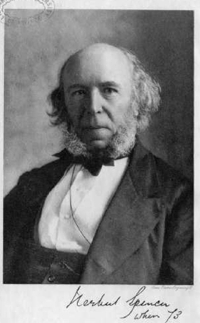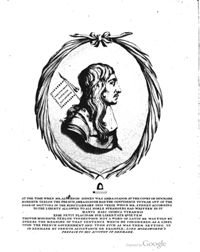
Herbert Spencer (1820-1903)


Frédéric Bastiat (1801-1850)

|
A Personal Selection
Here are some of the "great books" about liberty to tempt you to read further. The works in the list below are one-volume surveys of the classical liberal position before the emergence of the modern libertarian movement in the 1970s:
- Wilhelm von Humboldt, Ideen zu einem Versuch, die Gränzen der Wirksamkeit des Staates zu bestimmen (1792, 1851). Trans. as The Sphere and Duties of Government (1854). German HTML and facs. PDF. English HTML and facs. PDF.
- Benjamin Constant, Principes de politique, applicables à tous les gouvernemens représentatifs (The Principles of Politics) (1815). English trans. at OLL. French version in facs, PDF.
- Gustave de Molinari, Les Soirées de la rue Saint-Lazare (Conversations on Saint Lazarus Street) (1849), which I have edited and trans. (draft at OLL). French version in HTML and facs. PDF.
- Herbert Spencer, Social Statics: or, The Conditions essential to Happiness specified, and the First of them Developed (1851). HTML and facs. PDF.
- John Stuart Mill, On Liberty (1859) and The Subjection of Women (1869) published very suitably together in one volume in 1879. In HTML and facs. PDF. Also 1st ed.: On Liberty in facs. PDF; Subjection in facs. PDF.
- Bruce Smith, Liberty and Liberalism: A Protest against the Growing Tendency toward undue Interference by the State, with Individual Liberty, Private Enterprise and the Rights of Property (1888). HTML and facs. PDF.
- Ludwig von Mises, Liberalismus (Liberalism) (1927). German HTML and facs. PDF; Trans. at OLL.
See my blog post on this: The Great Books of Liberty I (25 March, 2021) and "One Volume Surveys of Classical Liberal Thought" (11 Jan. 2021).
Some other great books about liberty (on more specialised topics or just personal favourites):
- Aesop's Fables (c. 500 BC). Various editions in English and French and Latiin.
- Étienne de la Boétie, Discours de la servitude volontaire (1550s?). Various editions in English and French.
- Richard Overton, An Arrow against all Tyrants and Tyranny (Oct. 1646)
- Baruch Spinoza, Tractatus Theologico-Politicus (1670) [HTML] and facs. PDF.
- Algernon Sidney, Discourses Concerning Government (1683). HTML and facs. PDF.
- John Locke, Two Treatises of Civil Government (1689): a facs. PDF of the original 1690 edition and the Hollis edition of 1764 which was published for sale in the American colonies in HTML and facs. PDF.
- A “Fantasy Favourite”: if this were a serious critique of the state it would be one of my favourites: Edmund Burke, A Vindication of Natural Society: or, A View of the Miseries and Evils arising to Mankind from every Species of Artificial Society (1756) [HTML]
- Adam Smith, Theory of Moral Sentiments (1759) [HTML and facs. PDF] and Wealth of Nations (1776) [HTML and facs. PDF vol1 and vol2]
- Mary Wollstonecraft, A Vindication of the Rights of Woman (1792) [HTML]
- William Godwin, An Enquiry Concerning Political Justice (1793) in HTML and facs. PDF of vol1 and vol2.
- Condorcet, A Sketch for a Historical Picture of the Progress of the Human Spirit (1795) [HTML]
- J.B. Say, Traité d'économie politique (1803) and Cours complet (1828). TEP in French in HTML and facs. PDF; English in HTML and facs. PDF; Cours in HTML (to come) and facs. PDF vol. 1 and vol. 2.
- Thomas Hodgskin, The Natural and Artificial Right of Property Contrasted (1832) in HTML and facs. PDF.
- Frédéric Bastiat, The Law (1850) and Economic Harmonies (1851) in French [HTML] and English [HTML]
- Coquelin et al., Dictionnaire de l’économie politique (1852-53): links to French facs. PDFs.
- J.S. Mill, On the Subjection of Women (1869) in HTML and facs. PDF
- Lysander Spooner, Vices are not Crimes (1875) in HTML and facs.PDF, and No Treason: The Constitution of No Authority (1867-1870) [HTML]
- Herbert Spencer, The Principles of Ethics (1879-92) HTML and facs. PDF of vol1 and vol2; and The Principles of Sociology (1874-1896): vol.1 HTML and facs. PDF; vol.2 HTML and facs. PDF; vol.3 HTML and facs. PDF; with a combined table of contents for the set
- Gustave de Molinari, L’évolution économique du XIXe siècle: théorie du progrès (1880) [facs. PDF] and L’évolution politique et la Révolution (1884) [facs. PDF]
- Auberon Herbert, The Right and Wrong of Compulsion by the State: A Statement of the Moral Principles of the Party of Individual Liberty (1885) [HTML and facs. PDF]
- James Coolidge Carter, The Provinces of the Written and the Unwritten Law (1889) in HTML and facs. PDF
Disagreements within the Liberal Tradition
Also within the liberal tradition there have been fundamental disagreements about the nature of liberty which have thrown up contrasting perspectives:
- On the justice and wisdom of overthrowing tyrants: Edmund Burke, Reflections on the French Revolution (1790) [HTML] vs. Thomas Paine, Rights of Man (1791) [HTML]
- On the benefits or dangers of population growth: Thomas Malthus, An Essay on Population (1798, 1826) [HTML] vs. Condorcet, The Progress of the Human Mind (1795) [HTML], William Godwin, Of Population (1820) and Bastiat "Of Population" (1846)
- On individual rights vs. the "greatest good": John Stuart Mill, Utilitarianism (1863) vs. Herbert Spencer, The Principles of Ethics (1879) [HTML]
- On "equality" and "ordered liberty": James Fitzjames Stephen, Liberty, Equality, Fraternity (1873) vs. J.S. Mill, On Liberty (1859) and The Subjection of Women (1869)
- On "liberal democracy" (limited govt.) vs. "social democracy" (welfare state): L.T. Hobhouse, Liberalism (1911) [HTML] vs. Ludwig von Mises, Liberalism (1927) [OLL]
|




